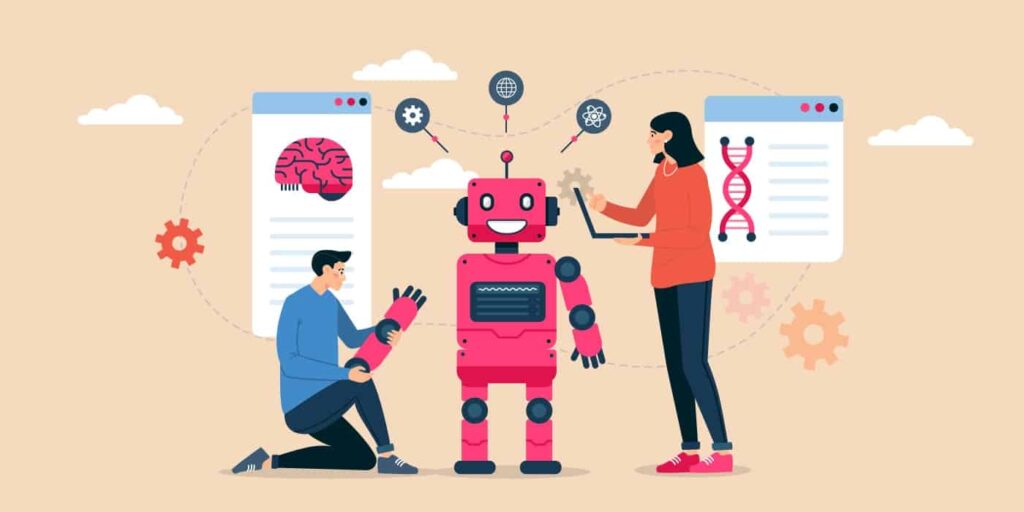Enterprise service management (ESM) benefits a business by improving the delivery of the services that employees need to perform their roles effectively. A key question that’s indicative of your company’s ESM maturity is this: “How many ways, channels, or portals do your company’s employees go through to get support from human resources (HR), facilities, finance, or IT?” This article explains what ESM is and how it helps before talking to how new artificial intelligence (AI)-based capabilities such as intelligent chatbots make an even greater difference to employee productivity and business outcomes.
Better Management of Enterprise Services
IT service management (ITSM) applied appropriately has proven to be an effective approach to managing technical issues and service requests. Plus, other departments within an enterprise, such as facilities, finance and HR, can benefit from adopting similar policy-driven procedures to manage the services they provide to employees.
Currently, each of these business functions may have a hotline or shared email box as a single point of contact for employees needing assistance in their respective domain. They don’t present a defined and shared common interface to the employees of the organization – requests are not rigorously logged and tracked – expectations are not or rarely set.
This article looks at how AI-based capabilities can make an even greater difference to employee productivity and business outcomes. #ITSM #AI Click To TweetWithout a single and simple place to go, employees inevitably will default into looking for individual contact when they need help. With no single point of contact and no system of record, everything happens below the radar and nothing gets managed. Demand is invisible, work is not tracked, performance isn’t measured, and requests can disappear into a “black hole”. This high level of internal friction typically results in employee frustration and wasted time chasing-up to get what they need in order to get it addressed. Ultimately, the company’s goal of having employees spending quality time supporting the company’s business is not met.
This is where ESM comes in. It adopts the best practices of ITSM and provides a single approach to service management across disparate organizational silos within the company. The intent is to bring corporate services to a level of cohesiveness where the assistance to internal customers can be tracked, measured, and improved. This includes the use of intelligent chatbots.
Better ESM with Chatbots
Now, let’s consider the role of chatbots within enterprises and the huge potential for symbiosis with ESM.
Chatbots are being deployed by organizations for a variety of purposes. Some chatbots are relatively simple and limited to answering questions with pre-loaded answers, while others (especially virtual agents) are more complex and intelligent, supporting inbound/outbound originating conversations and possessing the ability to learn along focused domains.
First-generation virtual agents specifically developed according to ITSM processes and procedures are already used by advanced IT organizations. Now the latest generation of virtual agents have been extended for other disciplines within enterprises, such as facilities, finance, and HR, with the intention of providing better customer service experiences for employees across all departments.
It’s better ESM with chatbots – because a virtual agent promises the ability to unify a company’s internal service capability with a single, simple, easy to access, and easy to use conversational interface for service requests. Conversations occur the way humans communicate and provide a more intuitive way of requesting assistance than logging into an application, sending an email, or searching a web portal for information. It’s been shown, for example, that the presence of a virtual agent between a support desk and employees can increase the adoption of self-service approaches to 50%.
But I’m not talking about intelligent chatbots yet.
Intelligent Chatbots are Better
The increase in self-service adoption is further enhanced if the virtual agents or intelligent chatbots are capable of integrating with all of the third-party infrastructure used by different departments across the enterprise. Here’s why:
- The deployment, and adding, of new skills to a virtual agent should be rapid – it should take a few weeks to implement, not months, and require only a small number of staff being involved, not teams of technicians.
- Employees interact conversationally as they do socially in everyday life, NOT having to learn a new user interface if they’ve a service issue for facilities versus finance, HR, or IT. Furthermore, domain specific skills focus the machine learning to support that department’s customers.
- The process of “rolling out” new skills, capabilities, and updates to a single, common virtual agent should not create change requirements in the underlying business applications.
- The “how,” “what happened,” “why,” and the interaction data collected by the virtual agent, which can present invaluable opportunities for process and usage improvement, will be more insightful if the way it’s gathered, parsed, and presented is consistent and common across the service ecosystem – increasing the effectiveness of self-service.
As a company expands, as its headcount grows, and as its operations become more complex, the ability of a virtual agent to provide value to the organization will continue to increase – a single service and support virtual agent can supply a practically unlimited amount of knowledge, and do so for all corporate departments.
The time is right to focus on the role of virtual agents in improving your organization’s service experiences. This article explains more. #AI #ITSM Click To TweetBest of all, intelligent chatbots become a familiar and always available 24×7 “point of help” to all employees which becomes even better over time.
The time is right to focus on the role of virtual agents in improving your organization’s service experiences. Act now to identify the impact virtual agents will have on your organization. Start developing the foundation that will enhance business operations through better support for employees. Where improving employee productivity through intelligent chatbots will positively contribute your company’s top and bottom line.
Wai Wong
Wai is Founder, President and Chief Executive Officer of Serviceaide - a global provider of enterprise service management solutions. A serial entrepreneur, he has been in the high-tech industry for 36 years. Wai held executive leadership roles at BEA where he was the EVP and Global Chief Product Officer and at CA Technologies where he was the SVP and GM of the Unicenter brand, SVP and GM of WW Services, and SVP and GM of interBiz. Wai received his Master’s and Bachelor’s degrees in computer science focusing on AI and Systems Architecture from Columbia University in NY.

